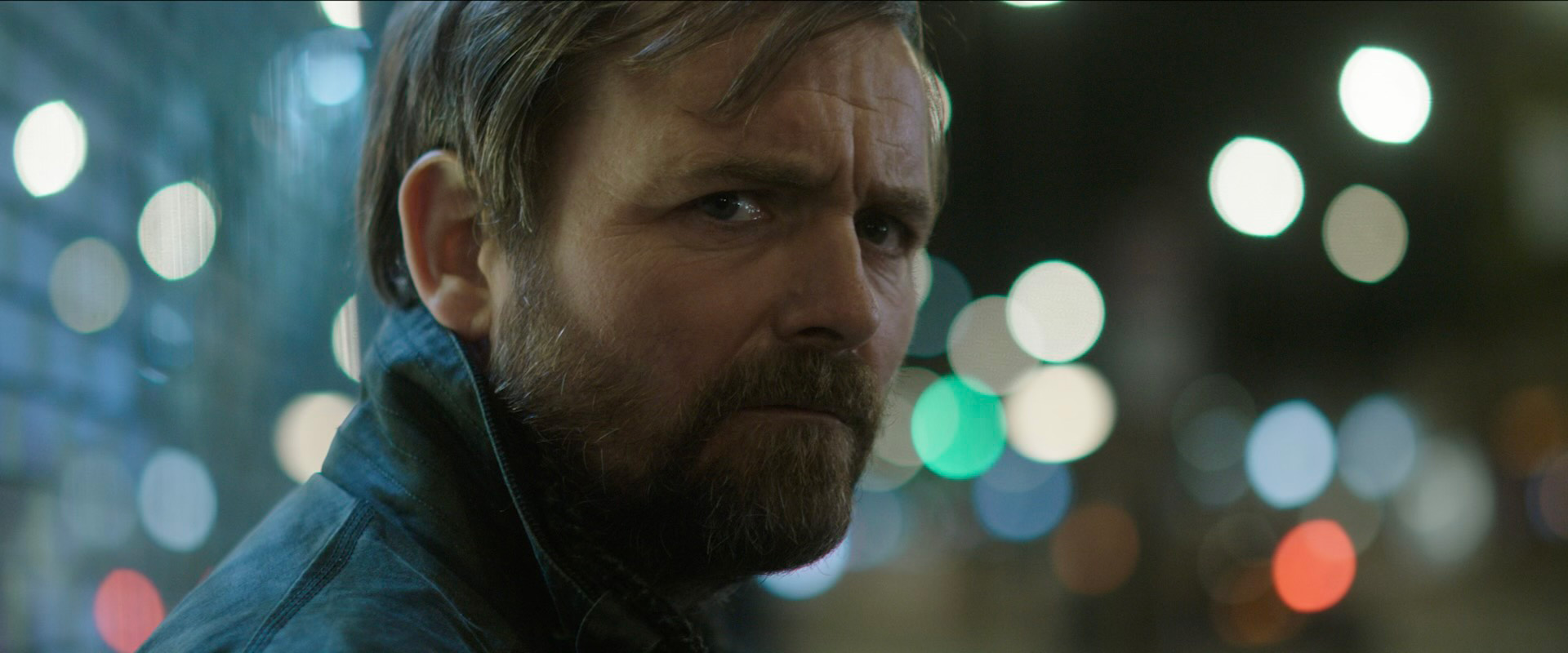It’s been ten years since Bull’s (Neil Maskell) son Aiden was taken by his ex-wife (Lois Brabin-Platt’s Gemma) and father-in-law (David Hayman’s Norm). Ten years that have apparently progressed with few worries for everyone but him. Norm still runs the local crew of heavies putting the screws to businesses they need to help move their merchandise; said crew have all started families without a thought of what occurred. That Bull’s return is unexpected shouldn’t surprise, considering how long he’s been gone, but the level of terror he induces in those staring down the other end of vengeance’s knife or gun certainly is. With nothing to lose as he demands Aiden’s current whereabouts, he burns through town without remorse.
More than just a revenge film, however, writer-director Paul Andrew Williams’ Bull proves a rather effective mystery too. You may not like the eventual answer (it’s a bit convenient in its eleventh-hour reveal), but our anti-hero’s gruesome retrieval of a pound of flesh from every man and woman who wronged him back then is really about what happened back then. Cue a series of flashbacks supplying more context with each new kill: a burning mobile home, a family picnic, and an example of just how ruthless Bull was as Norm’s muscle. To understand that he isn’t merely a father pushed to the edge makes the confusion towards his rampage that much more curious—they know his skill set and that he’s coming. Denial is a powerful drug.
With only 88 minutes to spare, Williams doesn’t have time to mess around. Everything must be meticulously planned and sequenced for optimal narrative and emotional effect, be that the order in which bodies fall or content of each glimpse into the past. No dialogue is rendered superfluous, every word either helping engage our intrigue or contextualize actions so that seemingly out-of-character mercy doesn’t ring odd. Williams thus drops us in at a sprint with Bull executing his first murder devoid of explanation or conversation. It’s bang-bang and done. Onto the next. He’ll ask his victims for information about Aiden’s location, but he won’t drag things on until they give some. There’s always another avenue and he’s privy to every corner worth checking.
There’s not a lot more to say since the plot pretty much takes care of itself. Bull gets closer to his endgame while Norm grows increasingly frustrated trying to figure out what’s happened. And the flashbacks lead past and present towards a nexus point as impossible as it is necessary. The entertainment is thus in how Bull goes about his killing spree. Some deaths are shocking in their brutality, others find some fun through additional levity. (David Nellist’s Clive happens to be with his children when confronted, so Bull adopts a menacing air of Big Bad Wolf.) Limbs are removed from bodies before they can process their danger and some (e.g. Jason Milligan’s Marco and Kevin Harvey’s Gary) hope preparation provides an upper hand.
Knowing you’re about to die isn’t the same as having the ability to stop it, though. Bull has always instilled fear in the other men, whether friends or relatives. It’s the reason Norm had to take such drastic lengths to remove him from the picture that Bull is willing to risk everything for payback. Clive looked like he was going to piss himself when sitting across from him, even before the bad blood rose. Seeing Bull in a car in front of his house, demanding he and his kids get in, conjures pure terror. Because it’s one thing to hear about others dying by Bull’s hands and another to know beyond a shadow of a doubt that you’re next on his list.
Maskell is great in the title role. He’s a formidable figure who refuses to compromise his mission—if someone pleads for their life he’ll give a cold stare before hurting them more. And though his motives are personal, he doesn’t ever relinquish the need to collect information for mere satisfaction. These people aren’t meant to die because he wants to watch life leave their eyes. They’re meant to die because he made them that promise. And this businesslike demeanor only renders Bull scarier. There will be no changing his mind. If he lets you go, it’s because you did what was asked of you to earn your freedom. He’s not averse to collateral damage when you don’t.
Bull is unapologetic since it neither cares about absolution nor justice. Williams and company only want us to figure out what happened to the boy because Bull was nothing if not an attentive, loving father. Everything he did was for his son—even moving against Norm to spark this whole chain of events in motion. (Hayman provides a formidable performance of his own with even less room for compromise when it comes to protecting his children.) The difference is that Aiden was an innocent. Aiden needed to be protected from a mother too far gone to supply the care he deserved. She and everyone else could do what they wanted if he remained safe. Bull would travel to Hell and back to ensure it.
Bull is playing the Fantasia International Film Festival.

